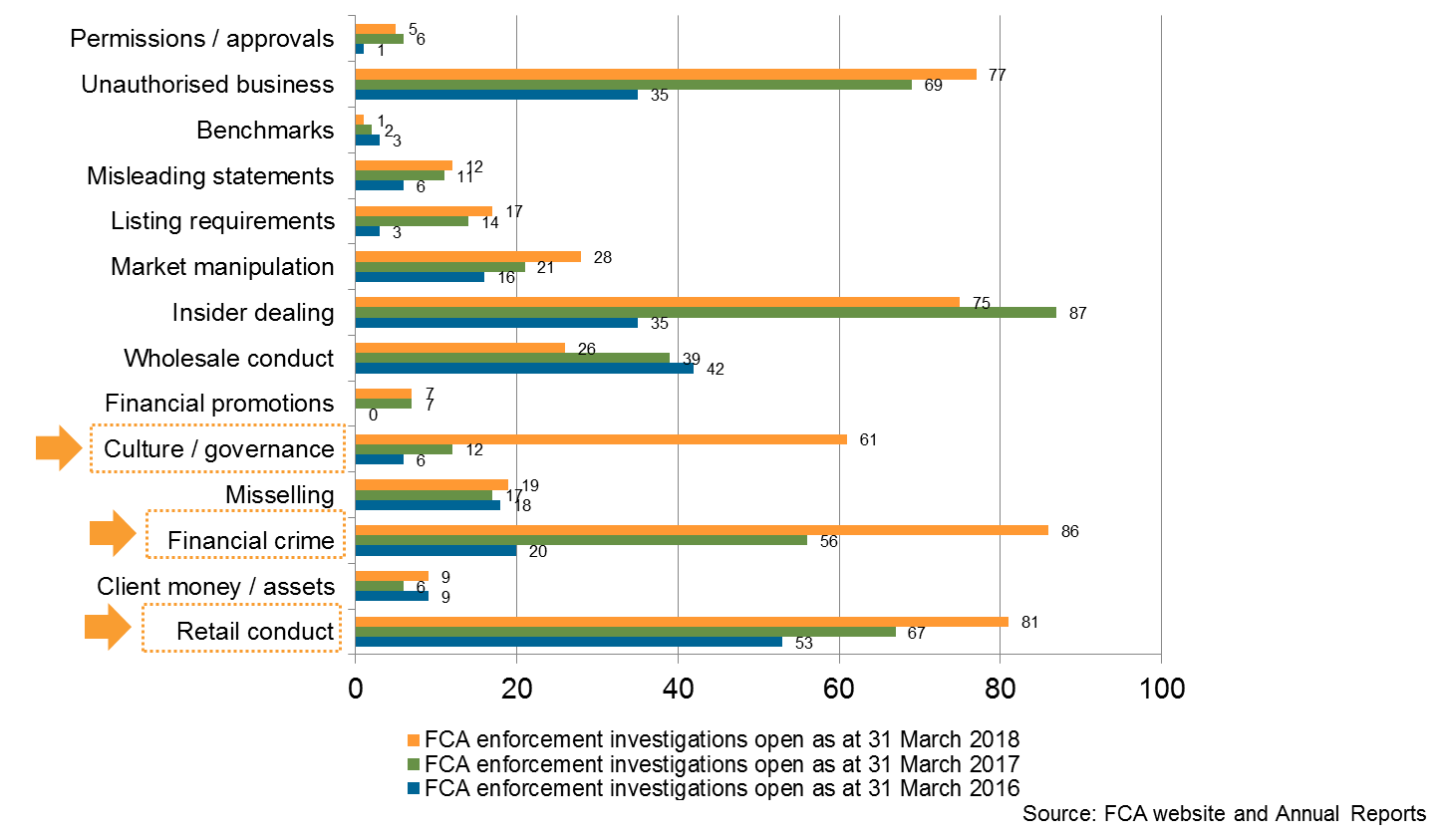- Home
- Blogs
- Investigations Insight
FCA annual report 2017/18: Enforcement highlights
Browse this blog post
Yesterday afternoon the UK Financial Conduct Authority (the FCA) published its Annual Report. Alongside the Annual Report, the FCA also published its usual Enforcement Annual Performance Report (the Report), which sets out an overview of the FCA’s enforcement activities during 2017/18. Set out below are some of the key points highlighted by the Report.
Financial penalties
As was already widely known, the value of financial penalties imposed by the FCA in 2017/18 dropped again with the FCA imposing only £69.9 million in financial penalties during this period. This constitutes a drop of 61% compared with the value of financial penalties imposed in 2017/18. The financial penalties imposed during 2017/18 were split across 16 enforcement actions, six of which were taken against firms (£69 million) and the remainder against individuals (£0.9 million).
Open enforcement investigations
The FCA has been very vocal about its intention to open more enforcement investigation and its use of those investigations as diagnostic tools. Consistent with this intention, the Report states that, as at 31 March 2018, the FCA had 504 open enforcement investigations, up from 410 enforcement investigations that it had open a year earlier on 1 April 2017.
Since the end of the FCA’s 2017/18 period, the FCA has confirmed to us via a Freedom of Information Act request that the total number of open FCA enforcement investigations has increased further, to 527 as at 11 June 2018.
Areas of enforcement focus
The Report contains a breakdown of the 504 enforcement investigations that the FCA currently has open, showing the areas that they concern. The graph below shows this breakdown, compared with the same breakdown published by the FCA for the previous two years.
The FCA has seen a particularly significant increase in the number of enforcement investigations it has open in two areas, namely financial crime (86, up from 56 as at the end of March 2017) and culture and governance (61, up from only 12 as at the end of March 2017). The FCA’s current enforcement focus on these two areas is perhaps unsurprising given that these were the first two cross-sector priorities listed by the FCA in its most recent Business Plan.
The FCA's latest statistics also show an increase in the number of enforcement investigations relating to retail conduct that the FCA is working on, alongside a decrease in the number of open enforcement investigations relating to wholesale conduct . These figures may suggest a shift away from the FCA's enforcement focus on wholesale conduct which we have seen over the past few years.
Discontinued investigations
Along with its promise to open more enforcement investigations, the FCA has also said that it will discontinue more of its enforcement investigations without taking any public action. This is consistent with the FCA’s intention to take a more diagnostic approach to its enforcement investigations.
In 2017/18, the FCA closed a total of 208 enforcement investigations. Only 16 of these closed cases resulted in public enforcement outcomes against firms (six) and individuals (ten). As a result, it appears that the FCA discontinued just short of 200 enforcement investigations during 2017/18 without taking any enforcement action against the subjects of those investigations. This represents a significant proportion of the FCA’s enforcement caseload. The area in which the FCA closed the most enforcement investigations during 2017/18 was insider dealing, with a total of 65 cases being closed during that period.
Length of enforcement investigations
In addition to being vocal about its diagnostic approach to enforcement investigations, the FCA has also talked about its more strategic and efficient approach to enforcement investigations. This approach is intended to allow the FCA to identify and focus quickly on the crux of a case. It was anticipated that this approach to enforcement investigations would lead to shorter and more focused enforcement investigations.
However, the statistics about the average length of FCA enforcement investigations included in the Report tell a different story. During 2017/18, the average length of concluded enforcement cases that resulted in an agreed settlement was 32.3 months, a significant increase from an average of 23.2 months in 2016/17. This increase in the average length of enforcement cases that result in settlement is not consistent with the FCA’s intended approach to conducting enforcement investigations. However, this statistic may in part be driven by the FCA concluding a number of legacy enforcement cases that have been open for some time, as was suggested in the FCA’s latest board minutes.

